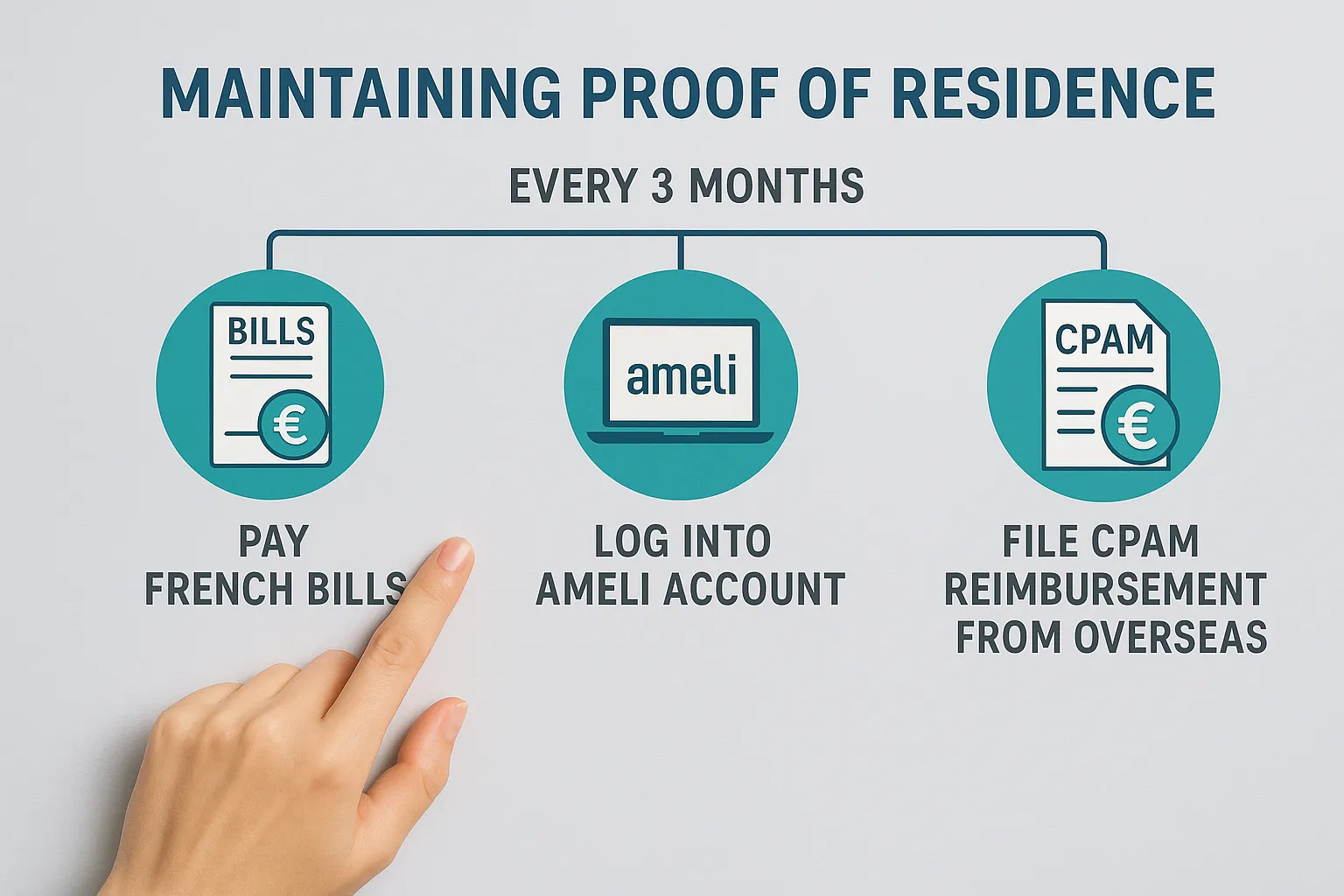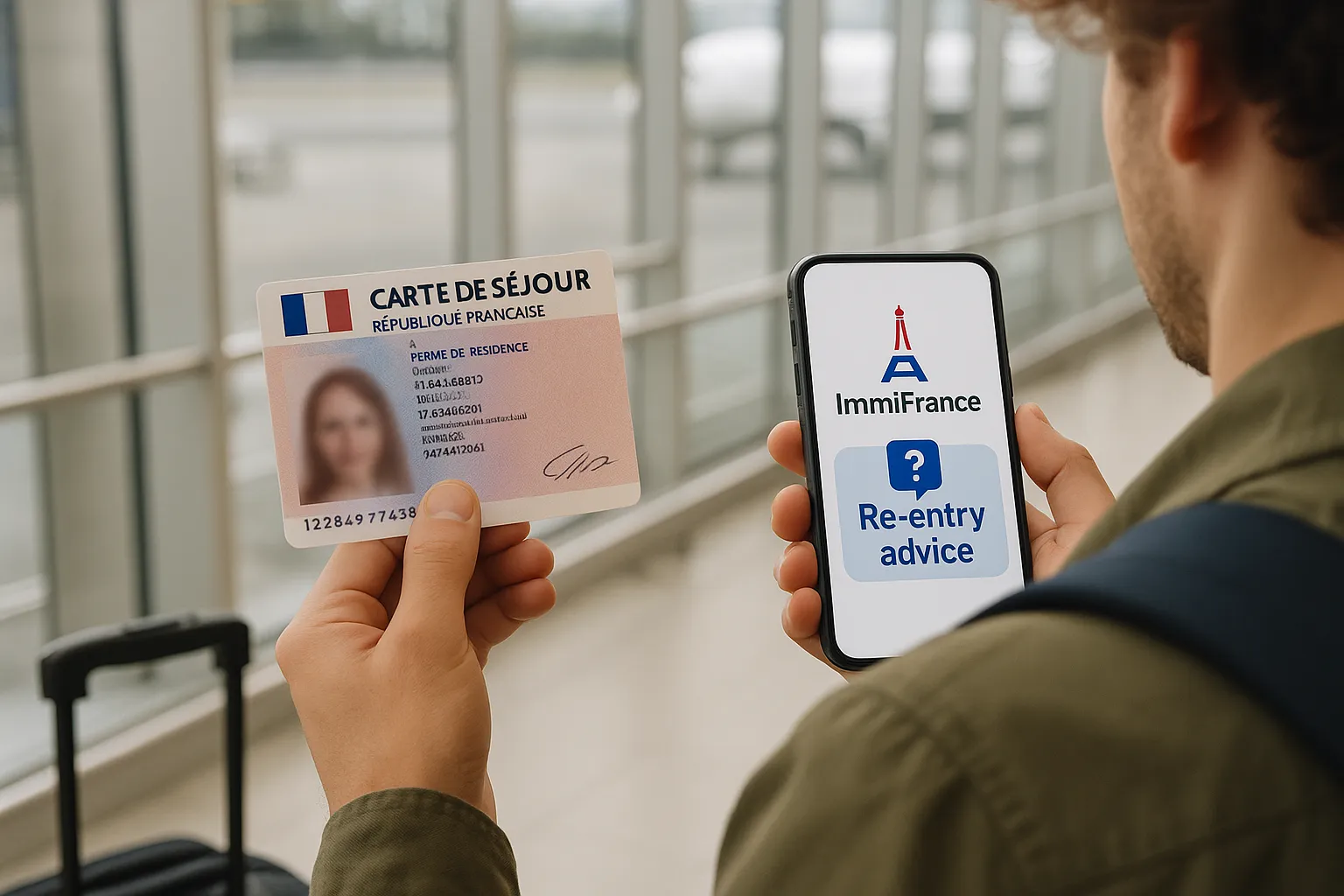How to Keep Your Resident Card After Long Absence From France

Leaving France for studies, a foreign assignment, or family obligations may seem harmless until you discover that an “extended stay abroad” can wipe out years of residence-building. Under French law, certain periods of absence automatically invalidate a carte de séjour or carte de résident, forcing you to restart the immigration ladder or apply for a costly visa de retour. This guide breaks down the exact absence limits for every major permit category, the legal bases in CESEDA, and the practical steps you can take before, during, and after your trip to keep your hard-won resident card alive.
Why Absence Rules Matter
French residence permits are granted on the assumption that the holder’s usual, primary residence remains in France. When you exceed the authorised absence threshold, prefectures consider that link broken. Consequences include:
- Automatic lapse of the permit under Articles L411-5, L433-5 and L424-13 CESEDA.
- Border refusal if you try to re-enter on an expired card.
- Requirement to apply for a new long-stay visa and start the process from scratch.
- Loss of accumulated years toward the 10-year carte de résident or French citizenship.
Because the lapse is automatic, prefectures rarely exercise discretion. Prevention therefore matters more than cure.
Absence Limits by Permit Type
| Permit type | Maximum uninterrupted absence allowed | Legal reference |
|---|---|---|
| Carte de résident 10-year (standard) | 3 consecutive years outside France | L411-5 CESEDA |
| EU Long-Term Resident (carte de résident UE) | 6 consecutive years outside EU / 3 years outside France but inside another EU state | Directive 2003/109/EC Art 9 + L416-7 CESEDA |
| Talent Passport categories | 6 consecutive months (general rule) or 12 months for business investor, researcher, or employee on mission | R421-6 CESEDA + Arrêté 28 Oct 2016 |
| Carte de séjour temporaire (1-year VPF, student, employee, entrepreneur, etc.) | 10 consecutive months or 12 cumulative months over total validity | L433-7 CESEDA |
| Carte de séjour pluriannuelle (2–4-year VPF, student, researcher) | 6 consecutive months or half the card’s validity, whichever is shorter | L433-5 CESEDA |
| APS – job seeker / business creator | 3 consecutive months | Circulaire NOR INT/K/13/05254C |
| Récépissé of renewal or first application | Absence strongly discouraged; card may be refused on return if proof of residence is shaky | Practice notes (Ministry of Interior) |
Note 1: For long-term missions mandated by a French employer, different rules may apply if the employment contract and French tax residency continue.
Note 2: Time spent in the French overseas departments (DOM) counts as presence in France. Time in other Schengen states counts as absence unless you have the EU LTR card.
What Counts as “Presence”?
- Entry and exit stamps in a non-EU passport remain the main evidence.
- French tax returns, CAF housing benefits, electricity bills, or a continuous French salary can reinforce that you remained resident despite short trips.
- For EU Long-Term Residents, living in another EU member state for professional reasons is acceptable for up to 6 years, but holding a local residence permit there resets the clock for France.
Common Scenarios and How to Handle Them
1. Studying Abroad on Erasmus or Exchange
Students holding a multi-year carte de séjour “étudiant” often spend a semester abroad. Because the card allows max 6 consecutive months of absence, ensure that:
- Your French university confirms the mobility in writing.
- You keep a French address (friend, family, or student residence) and renew rental insurance.
- You continue paying French student health insurance or mutuelle contributions.
2. Remote Employees Sent to a Branch Office
Talent Passport “salarié en mission” holders may stay abroad up to 12 months provided the French contract remains active. Maintain:
- Payslips issued by the French HQ.
- Social charges paid to URSSAF.
- Annual avis d’imposition in France.
3. Family Emergencies Beyond 6 Months
If a medical or humanitarian crisis forces you to overstay, gather evidence before you return:
- Medical certificates (translated if needed).
- Notarised affidavits from local authorities or the French consulate.
- Boarding passes proving partial presence in France during the period.
Although the lapse is automatic, some prefectures accept a recours gracieux if the overstay was involuntary and short (less than 30–60 days over the limit).
4. Carte de résident Holder Lost Track of Time
Spending more than 3 years outside France voids the 10-year card even if it is still physically valid. To re-establish rights:
- Apply for a long-stay visa (type D) marked “installation résident retour”.
- Show ties retained: property ownership, bank statements, taxes paid.
- On arrival, file a new carte de résident request under Article L411-6 (facilitated if family unity or French children exist).
ImmiFrance can build the dossier de continuité de résidence and liaise with the consulate to maximise approval odds.
Practical Checklist Before You Leave France
- Calculate the exact absence limit for your card using the table above. If uncertain, book a 30-minute consult with an ImmiFrance adviser.
- File your French income tax return for the current year, even if your income will soon come from abroad.
- Set up a reliable address: a friend’s mail box with a contrat de domiciliation or a legal domiciliation service.
- Maintain at least one active French bank account and utility contract (mobile phone or electricity on auto-pay).
- Scan and upload a complete copy of your residence permit, passport, and French insurance card to a secure cloud folder.
- If you expect to cross the limit, discuss a visa de retour possibility with the local prefecture before departure (rarely granted, but worth trying for medical missions or family care).
While Abroad: Keep Digital Footprints Alive

- Log in to FranceConnect services at least once every three months – the time-stamped access proves ongoing links.
- Use your French card for occasional online purchases or SEPA transfers.
- Submit déclaration trimestrielle de ressources if receiving CAF or Pôle emploi benefits.
Returning to France: Border and Prefecture Tips
- Carry documentary proof of travel dates (boarding passes, tickets) to rebut any mistaken overstay claims.
- If your card expired abroad but absence stayed within limits, present the original plus renewal récépissé or renouvellement en cours screenshots from ANEF.
- For borderline cases, ask the border officer to apply a visa de retour sticker under Article 18 of the Visa Code – some airports have duty officers authorised to validate it for resident card holders.
- Book a prefecture renewal appointment within 2 months of re-entry; delayed filing suggests weakened ties.
Evidence That Reinforces “Continuity of Residence”
| Evidence type | Why it helps |
|---|---|
| Annual French tax assessments | Confirms fiscal residency |
| Ongoing French employment contract or URSSAF contributions | Shows economic activity in France |
| CAF, CPAM or Pôle emploi statements | Affirms attachment to French social system |
| Lease and utility bills, even if sublet | Demonstrates housing link |
| School certificates for children enrolled in France | Strong family tie |
| French health-care reimbursements during trips back | Proves physical presence |
Tip: Upload key documents in your ImmiFrance client vault. Our system time-stamps each file, creating an independent chain of evidence accepted by many prefectures.
Special Cases
Holders of Protection Status (Refugee or Subsidiary Protection)
Protection beneficiaries risk losing status after 3 consecutive years outside France (L581-2 CESEDA). Notify OFPRA before any prolonged absence and request a maintien de statut letter.
Naturalization Applicants
Absence rules are stricter when you have a pending citizenship file. The Ministry of Interior expects uninterrupted residence from application date until decree. Exceeding six consecutive months may trigger rejection for “insufficient assimilation.” Notify your prefecture and provide compelling justification if you must leave.
Brexit “Withdrawal Agreement” Cards
UK nationals with Article 50 TEU cards lose rights after 5 continuous years outside France but may reside in another EU state without losing the card, provided they maintain short visits and ties.
What if You Already Exceeded the Limit?
- Do not attempt to enter on an invalid card – airlines can deny boarding under Carrier Liability rules.
- Apply for the appropriate long-stay visa at the French consulate. Mention Article L411-6 (“returning former resident”) to benefit from reduced document demands and fee waivers.
- Gather continuity proofs: French property deeds, tax filings, family ties. ImmiFrance can draft the lettre d’intention describing your absence.
- If denied, file a recours gracieux within 30 days and consider a recours contentieux before the Tribunal administratif.
How ImmiFrance Helps Safeguard Your Card
- Absence risk audit: We calculate your personal limit and flag red zones.
- Continuity evidence kit: Pre-formatted folders and templates accepted by most prefectures.
- ANEF monitoring: We renew your card remotely when the portal accepts early filings, avoiding last-minute stress.
- Visa de retour fast track: Lawyer-prepared request with 24-hour turnaround for emergencies.
- Border hotline: Real-time phone assistance if issues arise at Charles de Gaulle, Orly, Lyon or Marseille.
Ready to protect your French future? Book a 20-minute strategy call and get an individual action plan within 24 hours.

